MM322: Business Ethics, CSR, and International Business
VerifiedAdded on 2022/09/01
|9
|3060
|21
Essay
AI Summary
This essay delves into the realm of business ethics, corporate social responsibility (CSR), and their pivotal roles within the landscape of international business. It commences by defining CSR as a strategic business approach that integrates social, economic, and environmental considerations to benefit all stakeholders. The essay then explores the multifaceted benefits of CSR, including innovation, risk management, and enhanced customer relationships. It further examines how CSR practices influence global talent acquisition and retention, brand reputation management, and adherence to regulatory requirements, as well as philanthropic initiatives. The essay provides real-world examples, such as Unilever's innovation in water conservation and Xerox's community development programs, to illustrate the tangible impacts of CSR. Conversely, it also highlights the potential consequences of neglecting ethical standards, using the Volkswagen emissions scandal as a case in point. The essay underscores the significance of CSR in enhancing brand reputation, fostering stakeholder trust, and navigating crises. It also examines the regulatory aspects of CSR, citing India's mandatory CSR law as an example. Finally, the essay concludes by emphasizing the importance of a 'must-do' approach to CSR for international businesses, while also acknowledging the challenges associated with its implementation, such as regulatory complexities and potential customer skepticism.

Running Head: MANAGEMENT 0
BUSINESS ETHICS
BUSINESS ETHICS
Paraphrase This Document
Need a fresh take? Get an instant paraphrase of this document with our AI Paraphraser
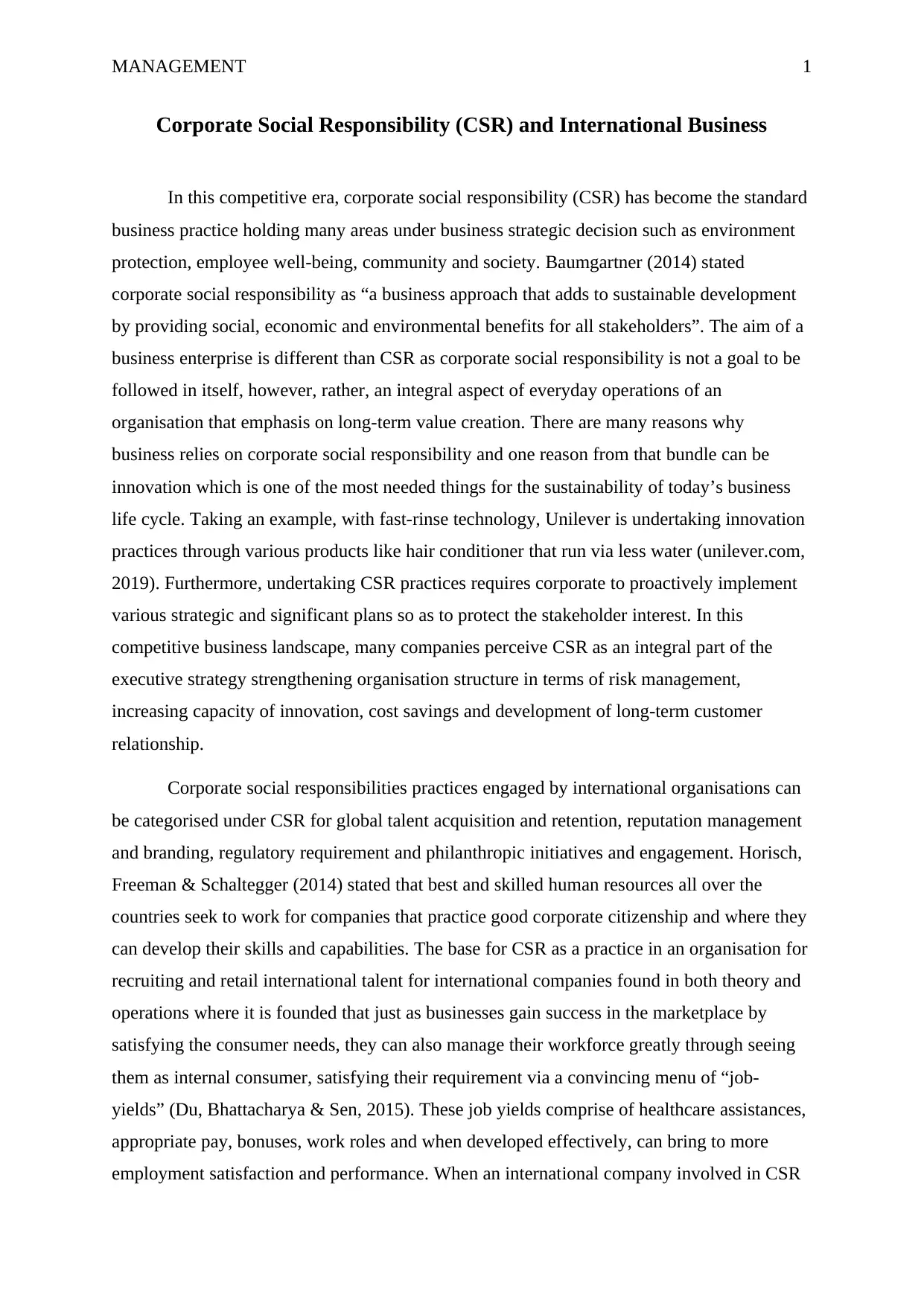
MANAGEMENT 1
Corporate Social Responsibility (CSR) and International Business
In this competitive era, corporate social responsibility (CSR) has become the standard
business practice holding many areas under business strategic decision such as environment
protection, employee well-being, community and society. Baumgartner (2014) stated
corporate social responsibility as “a business approach that adds to sustainable development
by providing social, economic and environmental benefits for all stakeholders”. The aim of a
business enterprise is different than CSR as corporate social responsibility is not a goal to be
followed in itself, however, rather, an integral aspect of everyday operations of an
organisation that emphasis on long-term value creation. There are many reasons why
business relies on corporate social responsibility and one reason from that bundle can be
innovation which is one of the most needed things for the sustainability of today’s business
life cycle. Taking an example, with fast-rinse technology, Unilever is undertaking innovation
practices through various products like hair conditioner that run via less water (unilever.com,
2019). Furthermore, undertaking CSR practices requires corporate to proactively implement
various strategic and significant plans so as to protect the stakeholder interest. In this
competitive business landscape, many companies perceive CSR as an integral part of the
executive strategy strengthening organisation structure in terms of risk management,
increasing capacity of innovation, cost savings and development of long-term customer
relationship.
Corporate social responsibilities practices engaged by international organisations can
be categorised under CSR for global talent acquisition and retention, reputation management
and branding, regulatory requirement and philanthropic initiatives and engagement. Horisch,
Freeman & Schaltegger (2014) stated that best and skilled human resources all over the
countries seek to work for companies that practice good corporate citizenship and where they
can develop their skills and capabilities. The base for CSR as a practice in an organisation for
recruiting and retail international talent for international companies found in both theory and
operations where it is founded that just as businesses gain success in the marketplace by
satisfying the consumer needs, they can also manage their workforce greatly through seeing
them as internal consumer, satisfying their requirement via a convincing menu of “job-
yields” (Du, Bhattacharya & Sen, 2015). These job yields comprise of healthcare assistances,
appropriate pay, bonuses, work roles and when developed effectively, can bring to more
employment satisfaction and performance. When an international company involved in CSR
Corporate Social Responsibility (CSR) and International Business
In this competitive era, corporate social responsibility (CSR) has become the standard
business practice holding many areas under business strategic decision such as environment
protection, employee well-being, community and society. Baumgartner (2014) stated
corporate social responsibility as “a business approach that adds to sustainable development
by providing social, economic and environmental benefits for all stakeholders”. The aim of a
business enterprise is different than CSR as corporate social responsibility is not a goal to be
followed in itself, however, rather, an integral aspect of everyday operations of an
organisation that emphasis on long-term value creation. There are many reasons why
business relies on corporate social responsibility and one reason from that bundle can be
innovation which is one of the most needed things for the sustainability of today’s business
life cycle. Taking an example, with fast-rinse technology, Unilever is undertaking innovation
practices through various products like hair conditioner that run via less water (unilever.com,
2019). Furthermore, undertaking CSR practices requires corporate to proactively implement
various strategic and significant plans so as to protect the stakeholder interest. In this
competitive business landscape, many companies perceive CSR as an integral part of the
executive strategy strengthening organisation structure in terms of risk management,
increasing capacity of innovation, cost savings and development of long-term customer
relationship.
Corporate social responsibilities practices engaged by international organisations can
be categorised under CSR for global talent acquisition and retention, reputation management
and branding, regulatory requirement and philanthropic initiatives and engagement. Horisch,
Freeman & Schaltegger (2014) stated that best and skilled human resources all over the
countries seek to work for companies that practice good corporate citizenship and where they
can develop their skills and capabilities. The base for CSR as a practice in an organisation for
recruiting and retail international talent for international companies found in both theory and
operations where it is founded that just as businesses gain success in the marketplace by
satisfying the consumer needs, they can also manage their workforce greatly through seeing
them as internal consumer, satisfying their requirement via a convincing menu of “job-
yields” (Du, Bhattacharya & Sen, 2015). These job yields comprise of healthcare assistances,
appropriate pay, bonuses, work roles and when developed effectively, can bring to more
employment satisfaction and performance. When an international company involved in CSR
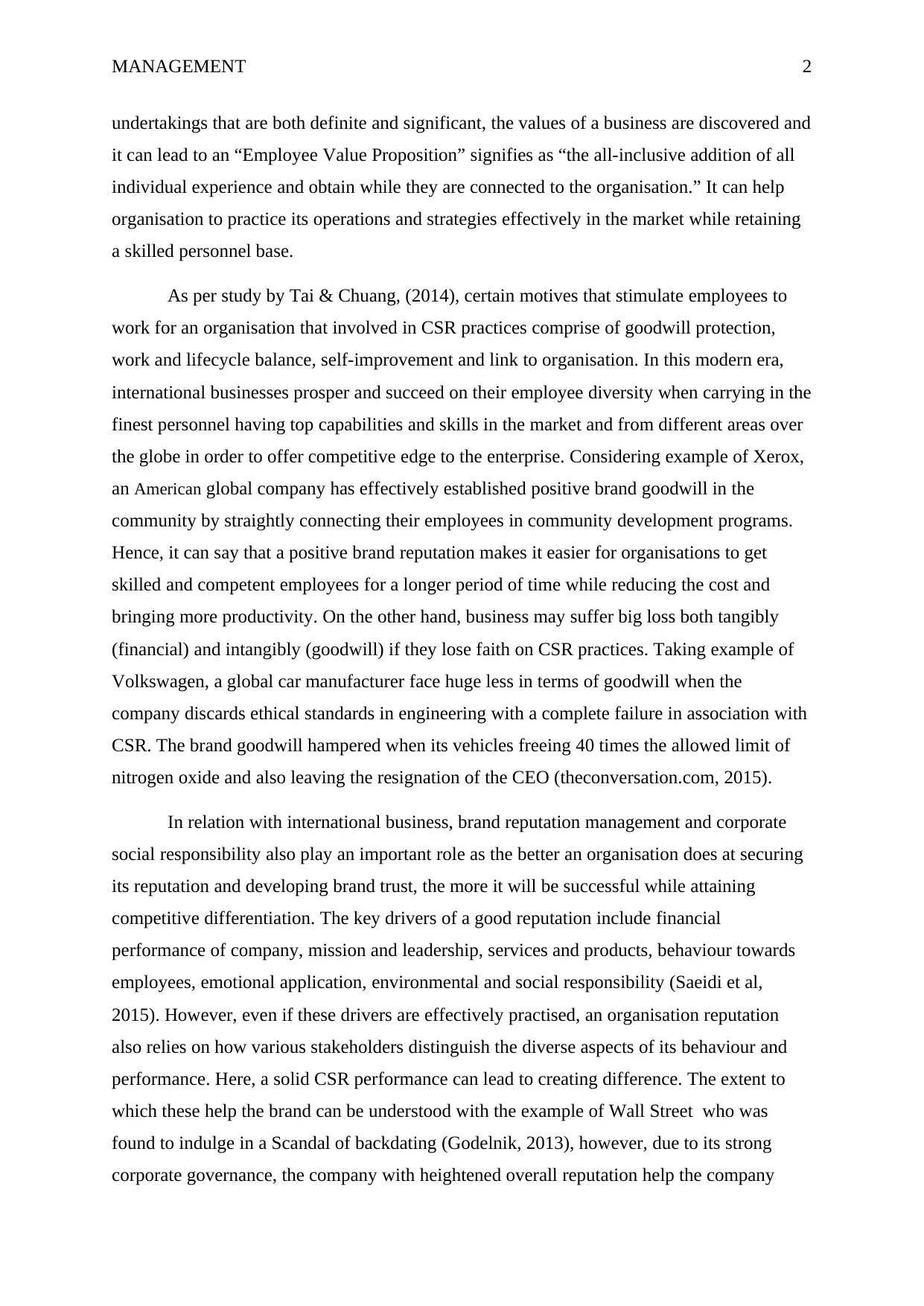
MANAGEMENT 2
undertakings that are both definite and significant, the values of a business are discovered and
it can lead to an “Employee Value Proposition” signifies as “the all-inclusive addition of all
individual experience and obtain while they are connected to the organisation.” It can help
organisation to practice its operations and strategies effectively in the market while retaining
a skilled personnel base.
As per study by Tai & Chuang, (2014), certain motives that stimulate employees to
work for an organisation that involved in CSR practices comprise of goodwill protection,
work and lifecycle balance, self-improvement and link to organisation. In this modern era,
international businesses prosper and succeed on their employee diversity when carrying in the
finest personnel having top capabilities and skills in the market and from different areas over
the globe in order to offer competitive edge to the enterprise. Considering example of Xerox,
an American global company has effectively established positive brand goodwill in the
community by straightly connecting their employees in community development programs.
Hence, it can say that a positive brand reputation makes it easier for organisations to get
skilled and competent employees for a longer period of time while reducing the cost and
bringing more productivity. On the other hand, business may suffer big loss both tangibly
(financial) and intangibly (goodwill) if they lose faith on CSR practices. Taking example of
Volkswagen, a global car manufacturer face huge less in terms of goodwill when the
company discards ethical standards in engineering with a complete failure in association with
CSR. The brand goodwill hampered when its vehicles freeing 40 times the allowed limit of
nitrogen oxide and also leaving the resignation of the CEO (theconversation.com, 2015).
In relation with international business, brand reputation management and corporate
social responsibility also play an important role as the better an organisation does at securing
its reputation and developing brand trust, the more it will be successful while attaining
competitive differentiation. The key drivers of a good reputation include financial
performance of company, mission and leadership, services and products, behaviour towards
employees, emotional application, environmental and social responsibility (Saeidi et al,
2015). However, even if these drivers are effectively practised, an organisation reputation
also relies on how various stakeholders distinguish the diverse aspects of its behaviour and
performance. Here, a solid CSR performance can lead to creating difference. The extent to
which these help the brand can be understood with the example of Wall Street who was
found to indulge in a Scandal of backdating (Godelnik, 2013), however, due to its strong
corporate governance, the company with heightened overall reputation help the company
undertakings that are both definite and significant, the values of a business are discovered and
it can lead to an “Employee Value Proposition” signifies as “the all-inclusive addition of all
individual experience and obtain while they are connected to the organisation.” It can help
organisation to practice its operations and strategies effectively in the market while retaining
a skilled personnel base.
As per study by Tai & Chuang, (2014), certain motives that stimulate employees to
work for an organisation that involved in CSR practices comprise of goodwill protection,
work and lifecycle balance, self-improvement and link to organisation. In this modern era,
international businesses prosper and succeed on their employee diversity when carrying in the
finest personnel having top capabilities and skills in the market and from different areas over
the globe in order to offer competitive edge to the enterprise. Considering example of Xerox,
an American global company has effectively established positive brand goodwill in the
community by straightly connecting their employees in community development programs.
Hence, it can say that a positive brand reputation makes it easier for organisations to get
skilled and competent employees for a longer period of time while reducing the cost and
bringing more productivity. On the other hand, business may suffer big loss both tangibly
(financial) and intangibly (goodwill) if they lose faith on CSR practices. Taking example of
Volkswagen, a global car manufacturer face huge less in terms of goodwill when the
company discards ethical standards in engineering with a complete failure in association with
CSR. The brand goodwill hampered when its vehicles freeing 40 times the allowed limit of
nitrogen oxide and also leaving the resignation of the CEO (theconversation.com, 2015).
In relation with international business, brand reputation management and corporate
social responsibility also play an important role as the better an organisation does at securing
its reputation and developing brand trust, the more it will be successful while attaining
competitive differentiation. The key drivers of a good reputation include financial
performance of company, mission and leadership, services and products, behaviour towards
employees, emotional application, environmental and social responsibility (Saeidi et al,
2015). However, even if these drivers are effectively practised, an organisation reputation
also relies on how various stakeholders distinguish the diverse aspects of its behaviour and
performance. Here, a solid CSR performance can lead to creating difference. The extent to
which these help the brand can be understood with the example of Wall Street who was
found to indulge in a Scandal of backdating (Godelnik, 2013), however, due to its strong
corporate governance, the company with heightened overall reputation help the company
⊘ This is a preview!⊘
Do you want full access?
Subscribe today to unlock all pages.

Trusted by 1+ million students worldwide
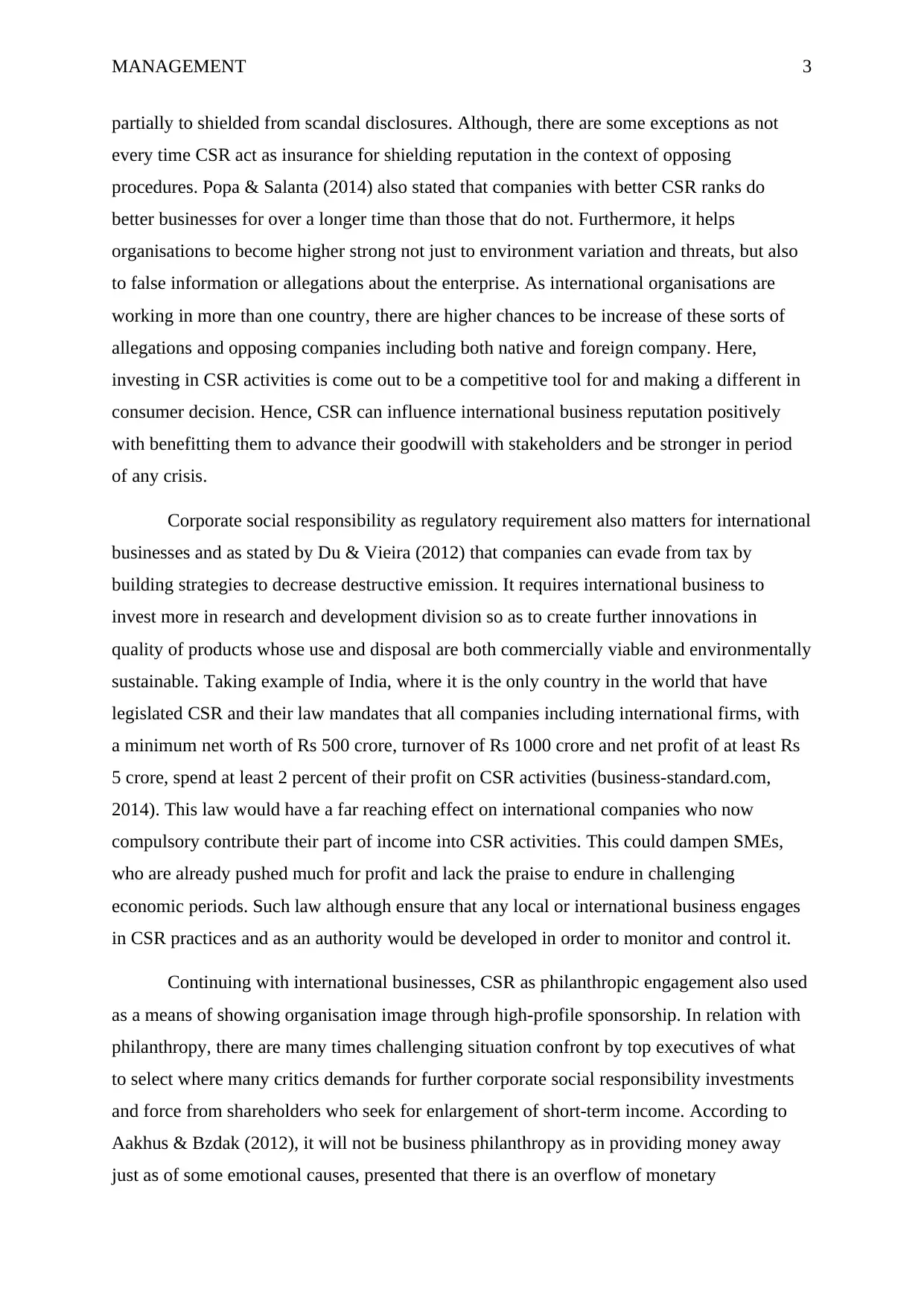
MANAGEMENT 3
partially to shielded from scandal disclosures. Although, there are some exceptions as not
every time CSR act as insurance for shielding reputation in the context of opposing
procedures. Popa & Salanta (2014) also stated that companies with better CSR ranks do
better businesses for over a longer time than those that do not. Furthermore, it helps
organisations to become higher strong not just to environment variation and threats, but also
to false information or allegations about the enterprise. As international organisations are
working in more than one country, there are higher chances to be increase of these sorts of
allegations and opposing companies including both native and foreign company. Here,
investing in CSR activities is come out to be a competitive tool for and making a different in
consumer decision. Hence, CSR can influence international business reputation positively
with benefitting them to advance their goodwill with stakeholders and be stronger in period
of any crisis.
Corporate social responsibility as regulatory requirement also matters for international
businesses and as stated by Du & Vieira (2012) that companies can evade from tax by
building strategies to decrease destructive emission. It requires international business to
invest more in research and development division so as to create further innovations in
quality of products whose use and disposal are both commercially viable and environmentally
sustainable. Taking example of India, where it is the only country in the world that have
legislated CSR and their law mandates that all companies including international firms, with
a minimum net worth of Rs 500 crore, turnover of Rs 1000 crore and net profit of at least Rs
5 crore, spend at least 2 percent of their profit on CSR activities (business-standard.com,
2014). This law would have a far reaching effect on international companies who now
compulsory contribute their part of income into CSR activities. This could dampen SMEs,
who are already pushed much for profit and lack the praise to endure in challenging
economic periods. Such law although ensure that any local or international business engages
in CSR practices and as an authority would be developed in order to monitor and control it.
Continuing with international businesses, CSR as philanthropic engagement also used
as a means of showing organisation image through high-profile sponsorship. In relation with
philanthropy, there are many times challenging situation confront by top executives of what
to select where many critics demands for further corporate social responsibility investments
and force from shareholders who seek for enlargement of short-term income. According to
Aakhus & Bzdak (2012), it will not be business philanthropy as in providing money away
just as of some emotional causes, presented that there is an overflow of monetary
partially to shielded from scandal disclosures. Although, there are some exceptions as not
every time CSR act as insurance for shielding reputation in the context of opposing
procedures. Popa & Salanta (2014) also stated that companies with better CSR ranks do
better businesses for over a longer time than those that do not. Furthermore, it helps
organisations to become higher strong not just to environment variation and threats, but also
to false information or allegations about the enterprise. As international organisations are
working in more than one country, there are higher chances to be increase of these sorts of
allegations and opposing companies including both native and foreign company. Here,
investing in CSR activities is come out to be a competitive tool for and making a different in
consumer decision. Hence, CSR can influence international business reputation positively
with benefitting them to advance their goodwill with stakeholders and be stronger in period
of any crisis.
Corporate social responsibility as regulatory requirement also matters for international
businesses and as stated by Du & Vieira (2012) that companies can evade from tax by
building strategies to decrease destructive emission. It requires international business to
invest more in research and development division so as to create further innovations in
quality of products whose use and disposal are both commercially viable and environmentally
sustainable. Taking example of India, where it is the only country in the world that have
legislated CSR and their law mandates that all companies including international firms, with
a minimum net worth of Rs 500 crore, turnover of Rs 1000 crore and net profit of at least Rs
5 crore, spend at least 2 percent of their profit on CSR activities (business-standard.com,
2014). This law would have a far reaching effect on international companies who now
compulsory contribute their part of income into CSR activities. This could dampen SMEs,
who are already pushed much for profit and lack the praise to endure in challenging
economic periods. Such law although ensure that any local or international business engages
in CSR practices and as an authority would be developed in order to monitor and control it.
Continuing with international businesses, CSR as philanthropic engagement also used
as a means of showing organisation image through high-profile sponsorship. In relation with
philanthropy, there are many times challenging situation confront by top executives of what
to select where many critics demands for further corporate social responsibility investments
and force from shareholders who seek for enlargement of short-term income. According to
Aakhus & Bzdak (2012), it will not be business philanthropy as in providing money away
just as of some emotional causes, presented that there is an overflow of monetary
Paraphrase This Document
Need a fresh take? Get an instant paraphrase of this document with our AI Paraphraser
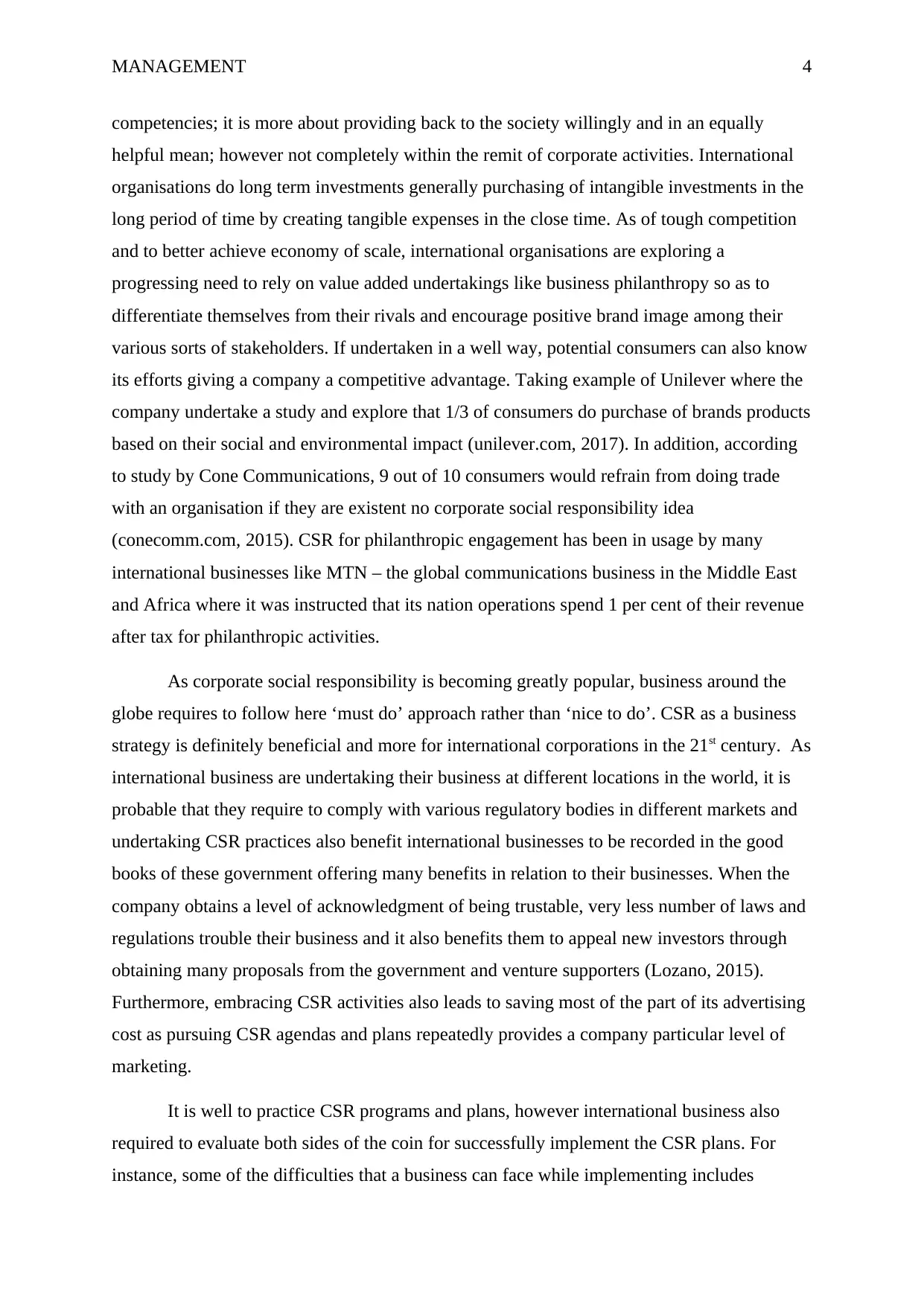
MANAGEMENT 4
competencies; it is more about providing back to the society willingly and in an equally
helpful mean; however not completely within the remit of corporate activities. International
organisations do long term investments generally purchasing of intangible investments in the
long period of time by creating tangible expenses in the close time. As of tough competition
and to better achieve economy of scale, international organisations are exploring a
progressing need to rely on value added undertakings like business philanthropy so as to
differentiate themselves from their rivals and encourage positive brand image among their
various sorts of stakeholders. If undertaken in a well way, potential consumers can also know
its efforts giving a company a competitive advantage. Taking example of Unilever where the
company undertake a study and explore that 1/3 of consumers do purchase of brands products
based on their social and environmental impact (unilever.com, 2017). In addition, according
to study by Cone Communications, 9 out of 10 consumers would refrain from doing trade
with an organisation if they are existent no corporate social responsibility idea
(conecomm.com, 2015). CSR for philanthropic engagement has been in usage by many
international businesses like MTN – the global communications business in the Middle East
and Africa where it was instructed that its nation operations spend 1 per cent of their revenue
after tax for philanthropic activities.
As corporate social responsibility is becoming greatly popular, business around the
globe requires to follow here ‘must do’ approach rather than ‘nice to do’. CSR as a business
strategy is definitely beneficial and more for international corporations in the 21st century. As
international business are undertaking their business at different locations in the world, it is
probable that they require to comply with various regulatory bodies in different markets and
undertaking CSR practices also benefit international businesses to be recorded in the good
books of these government offering many benefits in relation to their businesses. When the
company obtains a level of acknowledgment of being trustable, very less number of laws and
regulations trouble their business and it also benefits them to appeal new investors through
obtaining many proposals from the government and venture supporters (Lozano, 2015).
Furthermore, embracing CSR activities also leads to saving most of the part of its advertising
cost as pursuing CSR agendas and plans repeatedly provides a company particular level of
marketing.
It is well to practice CSR programs and plans, however international business also
required to evaluate both sides of the coin for successfully implement the CSR plans. For
instance, some of the difficulties that a business can face while implementing includes
competencies; it is more about providing back to the society willingly and in an equally
helpful mean; however not completely within the remit of corporate activities. International
organisations do long term investments generally purchasing of intangible investments in the
long period of time by creating tangible expenses in the close time. As of tough competition
and to better achieve economy of scale, international organisations are exploring a
progressing need to rely on value added undertakings like business philanthropy so as to
differentiate themselves from their rivals and encourage positive brand image among their
various sorts of stakeholders. If undertaken in a well way, potential consumers can also know
its efforts giving a company a competitive advantage. Taking example of Unilever where the
company undertake a study and explore that 1/3 of consumers do purchase of brands products
based on their social and environmental impact (unilever.com, 2017). In addition, according
to study by Cone Communications, 9 out of 10 consumers would refrain from doing trade
with an organisation if they are existent no corporate social responsibility idea
(conecomm.com, 2015). CSR for philanthropic engagement has been in usage by many
international businesses like MTN – the global communications business in the Middle East
and Africa where it was instructed that its nation operations spend 1 per cent of their revenue
after tax for philanthropic activities.
As corporate social responsibility is becoming greatly popular, business around the
globe requires to follow here ‘must do’ approach rather than ‘nice to do’. CSR as a business
strategy is definitely beneficial and more for international corporations in the 21st century. As
international business are undertaking their business at different locations in the world, it is
probable that they require to comply with various regulatory bodies in different markets and
undertaking CSR practices also benefit international businesses to be recorded in the good
books of these government offering many benefits in relation to their businesses. When the
company obtains a level of acknowledgment of being trustable, very less number of laws and
regulations trouble their business and it also benefits them to appeal new investors through
obtaining many proposals from the government and venture supporters (Lozano, 2015).
Furthermore, embracing CSR activities also leads to saving most of the part of its advertising
cost as pursuing CSR agendas and plans repeatedly provides a company particular level of
marketing.
It is well to practice CSR programs and plans, however international business also
required to evaluate both sides of the coin for successfully implement the CSR plans. For
instance, some of the difficulties that a business can face while implementing includes
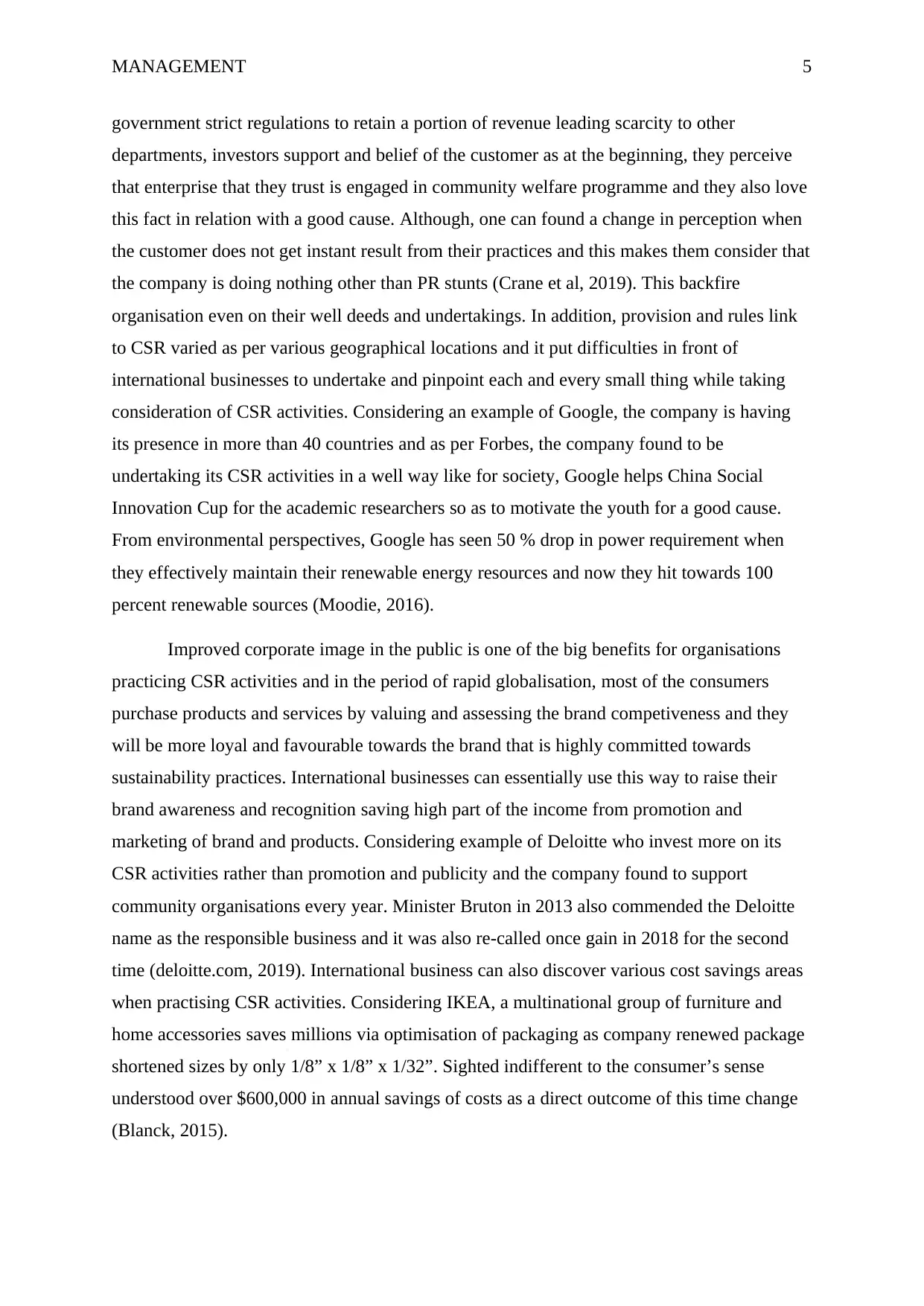
MANAGEMENT 5
government strict regulations to retain a portion of revenue leading scarcity to other
departments, investors support and belief of the customer as at the beginning, they perceive
that enterprise that they trust is engaged in community welfare programme and they also love
this fact in relation with a good cause. Although, one can found a change in perception when
the customer does not get instant result from their practices and this makes them consider that
the company is doing nothing other than PR stunts (Crane et al, 2019). This backfire
organisation even on their well deeds and undertakings. In addition, provision and rules link
to CSR varied as per various geographical locations and it put difficulties in front of
international businesses to undertake and pinpoint each and every small thing while taking
consideration of CSR activities. Considering an example of Google, the company is having
its presence in more than 40 countries and as per Forbes, the company found to be
undertaking its CSR activities in a well way like for society, Google helps China Social
Innovation Cup for the academic researchers so as to motivate the youth for a good cause.
From environmental perspectives, Google has seen 50 % drop in power requirement when
they effectively maintain their renewable energy resources and now they hit towards 100
percent renewable sources (Moodie, 2016).
Improved corporate image in the public is one of the big benefits for organisations
practicing CSR activities and in the period of rapid globalisation, most of the consumers
purchase products and services by valuing and assessing the brand competiveness and they
will be more loyal and favourable towards the brand that is highly committed towards
sustainability practices. International businesses can essentially use this way to raise their
brand awareness and recognition saving high part of the income from promotion and
marketing of brand and products. Considering example of Deloitte who invest more on its
CSR activities rather than promotion and publicity and the company found to support
community organisations every year. Minister Bruton in 2013 also commended the Deloitte
name as the responsible business and it was also re-called once gain in 2018 for the second
time (deloitte.com, 2019). International business can also discover various cost savings areas
when practising CSR activities. Considering IKEA, a multinational group of furniture and
home accessories saves millions via optimisation of packaging as company renewed package
shortened sizes by only 1/8” x 1/8” x 1/32”. Sighted indifferent to the consumer’s sense
understood over $600,000 in annual savings of costs as a direct outcome of this time change
(Blanck, 2015).
government strict regulations to retain a portion of revenue leading scarcity to other
departments, investors support and belief of the customer as at the beginning, they perceive
that enterprise that they trust is engaged in community welfare programme and they also love
this fact in relation with a good cause. Although, one can found a change in perception when
the customer does not get instant result from their practices and this makes them consider that
the company is doing nothing other than PR stunts (Crane et al, 2019). This backfire
organisation even on their well deeds and undertakings. In addition, provision and rules link
to CSR varied as per various geographical locations and it put difficulties in front of
international businesses to undertake and pinpoint each and every small thing while taking
consideration of CSR activities. Considering an example of Google, the company is having
its presence in more than 40 countries and as per Forbes, the company found to be
undertaking its CSR activities in a well way like for society, Google helps China Social
Innovation Cup for the academic researchers so as to motivate the youth for a good cause.
From environmental perspectives, Google has seen 50 % drop in power requirement when
they effectively maintain their renewable energy resources and now they hit towards 100
percent renewable sources (Moodie, 2016).
Improved corporate image in the public is one of the big benefits for organisations
practicing CSR activities and in the period of rapid globalisation, most of the consumers
purchase products and services by valuing and assessing the brand competiveness and they
will be more loyal and favourable towards the brand that is highly committed towards
sustainability practices. International businesses can essentially use this way to raise their
brand awareness and recognition saving high part of the income from promotion and
marketing of brand and products. Considering example of Deloitte who invest more on its
CSR activities rather than promotion and publicity and the company found to support
community organisations every year. Minister Bruton in 2013 also commended the Deloitte
name as the responsible business and it was also re-called once gain in 2018 for the second
time (deloitte.com, 2019). International business can also discover various cost savings areas
when practising CSR activities. Considering IKEA, a multinational group of furniture and
home accessories saves millions via optimisation of packaging as company renewed package
shortened sizes by only 1/8” x 1/8” x 1/32”. Sighted indifferent to the consumer’s sense
understood over $600,000 in annual savings of costs as a direct outcome of this time change
(Blanck, 2015).
⊘ This is a preview!⊘
Do you want full access?
Subscribe today to unlock all pages.

Trusted by 1+ million students worldwide
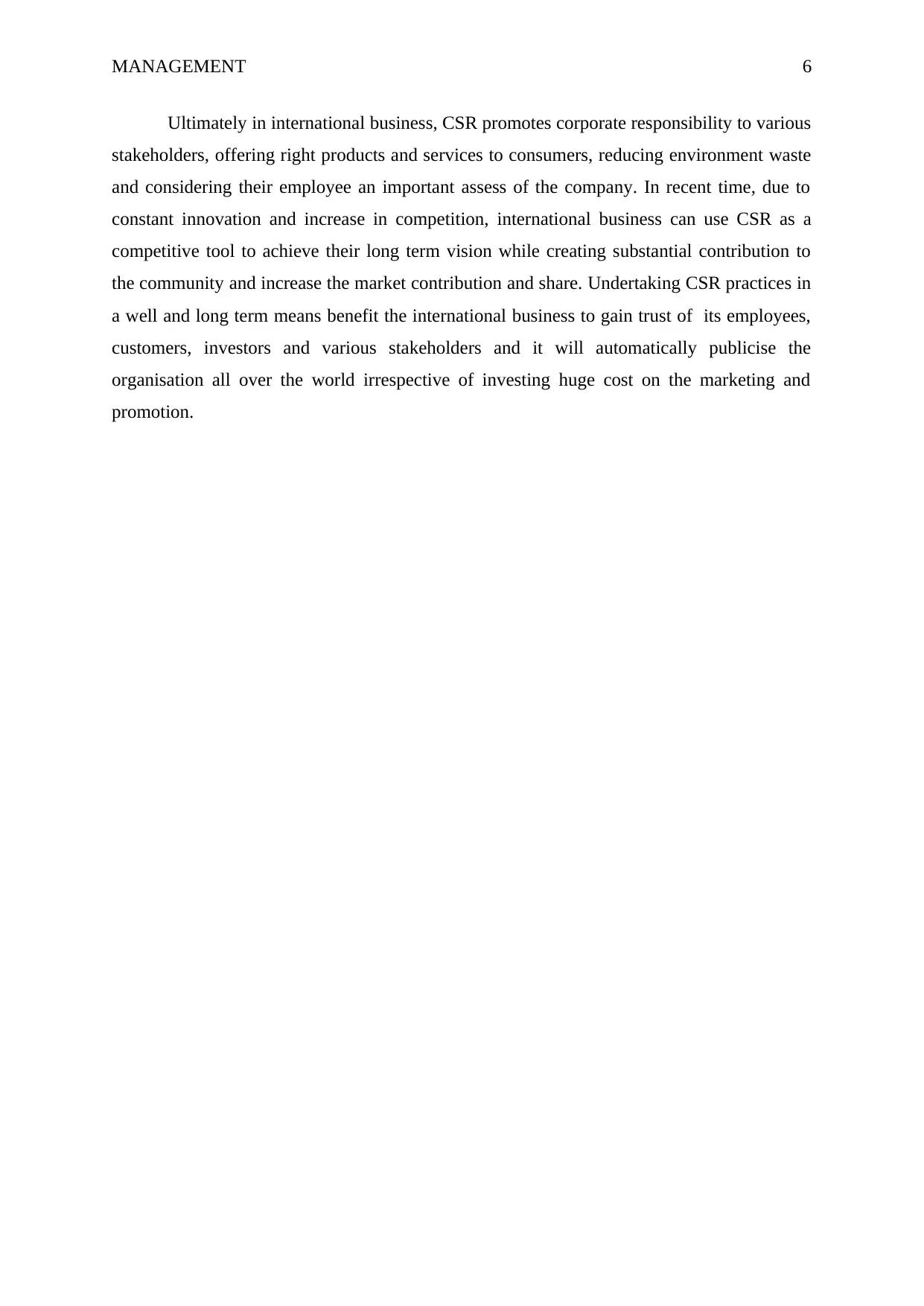
MANAGEMENT 6
Ultimately in international business, CSR promotes corporate responsibility to various
stakeholders, offering right products and services to consumers, reducing environment waste
and considering their employee an important assess of the company. In recent time, due to
constant innovation and increase in competition, international business can use CSR as a
competitive tool to achieve their long term vision while creating substantial contribution to
the community and increase the market contribution and share. Undertaking CSR practices in
a well and long term means benefit the international business to gain trust of its employees,
customers, investors and various stakeholders and it will automatically publicise the
organisation all over the world irrespective of investing huge cost on the marketing and
promotion.
Ultimately in international business, CSR promotes corporate responsibility to various
stakeholders, offering right products and services to consumers, reducing environment waste
and considering their employee an important assess of the company. In recent time, due to
constant innovation and increase in competition, international business can use CSR as a
competitive tool to achieve their long term vision while creating substantial contribution to
the community and increase the market contribution and share. Undertaking CSR practices in
a well and long term means benefit the international business to gain trust of its employees,
customers, investors and various stakeholders and it will automatically publicise the
organisation all over the world irrespective of investing huge cost on the marketing and
promotion.
Paraphrase This Document
Need a fresh take? Get an instant paraphrase of this document with our AI Paraphraser
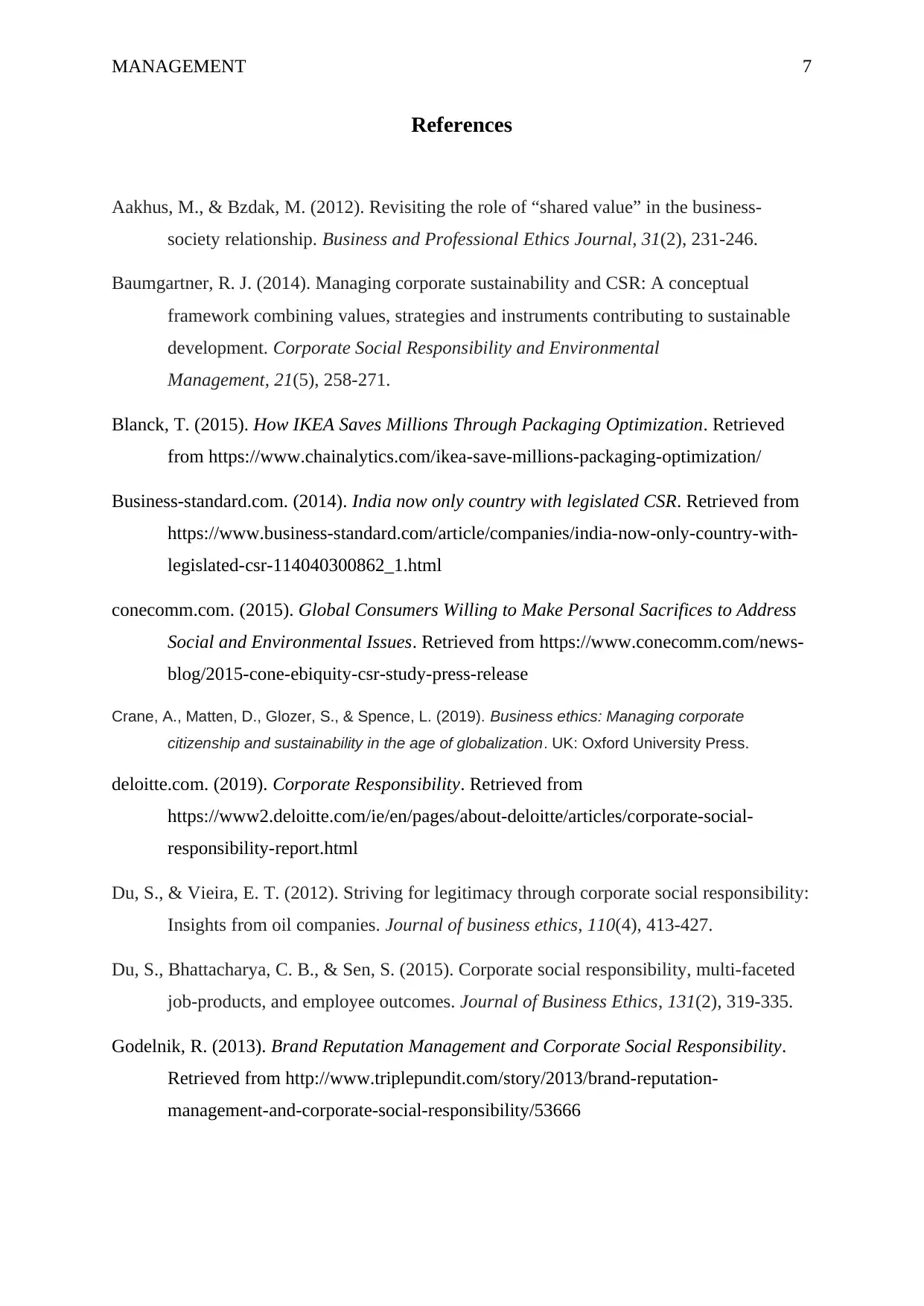
MANAGEMENT 7
References
Aakhus, M., & Bzdak, M. (2012). Revisiting the role of “shared value” in the business-
society relationship. Business and Professional Ethics Journal, 31(2), 231-246.
Baumgartner, R. J. (2014). Managing corporate sustainability and CSR: A conceptual
framework combining values, strategies and instruments contributing to sustainable
development. Corporate Social Responsibility and Environmental
Management, 21(5), 258-271.
Blanck, T. (2015). How IKEA Saves Millions Through Packaging Optimization. Retrieved
from https://www.chainalytics.com/ikea-save-millions-packaging-optimization/
Business-standard.com. (2014). India now only country with legislated CSR. Retrieved from
https://www.business-standard.com/article/companies/india-now-only-country-with-
legislated-csr-114040300862_1.html
conecomm.com. (2015). Global Consumers Willing to Make Personal Sacrifices to Address
Social and Environmental Issues. Retrieved from https://www.conecomm.com/news-
blog/2015-cone-ebiquity-csr-study-press-release
Crane, A., Matten, D., Glozer, S., & Spence, L. (2019). Business ethics: Managing corporate
citizenship and sustainability in the age of globalization. UK: Oxford University Press.
deloitte.com. (2019). Corporate Responsibility. Retrieved from
https://www2.deloitte.com/ie/en/pages/about-deloitte/articles/corporate-social-
responsibility-report.html
Du, S., & Vieira, E. T. (2012). Striving for legitimacy through corporate social responsibility:
Insights from oil companies. Journal of business ethics, 110(4), 413-427.
Du, S., Bhattacharya, C. B., & Sen, S. (2015). Corporate social responsibility, multi-faceted
job-products, and employee outcomes. Journal of Business Ethics, 131(2), 319-335.
Godelnik, R. (2013). Brand Reputation Management and Corporate Social Responsibility.
Retrieved from http://www.triplepundit.com/story/2013/brand-reputation-
management-and-corporate-social-responsibility/53666
References
Aakhus, M., & Bzdak, M. (2012). Revisiting the role of “shared value” in the business-
society relationship. Business and Professional Ethics Journal, 31(2), 231-246.
Baumgartner, R. J. (2014). Managing corporate sustainability and CSR: A conceptual
framework combining values, strategies and instruments contributing to sustainable
development. Corporate Social Responsibility and Environmental
Management, 21(5), 258-271.
Blanck, T. (2015). How IKEA Saves Millions Through Packaging Optimization. Retrieved
from https://www.chainalytics.com/ikea-save-millions-packaging-optimization/
Business-standard.com. (2014). India now only country with legislated CSR. Retrieved from
https://www.business-standard.com/article/companies/india-now-only-country-with-
legislated-csr-114040300862_1.html
conecomm.com. (2015). Global Consumers Willing to Make Personal Sacrifices to Address
Social and Environmental Issues. Retrieved from https://www.conecomm.com/news-
blog/2015-cone-ebiquity-csr-study-press-release
Crane, A., Matten, D., Glozer, S., & Spence, L. (2019). Business ethics: Managing corporate
citizenship and sustainability in the age of globalization. UK: Oxford University Press.
deloitte.com. (2019). Corporate Responsibility. Retrieved from
https://www2.deloitte.com/ie/en/pages/about-deloitte/articles/corporate-social-
responsibility-report.html
Du, S., & Vieira, E. T. (2012). Striving for legitimacy through corporate social responsibility:
Insights from oil companies. Journal of business ethics, 110(4), 413-427.
Du, S., Bhattacharya, C. B., & Sen, S. (2015). Corporate social responsibility, multi-faceted
job-products, and employee outcomes. Journal of Business Ethics, 131(2), 319-335.
Godelnik, R. (2013). Brand Reputation Management and Corporate Social Responsibility.
Retrieved from http://www.triplepundit.com/story/2013/brand-reputation-
management-and-corporate-social-responsibility/53666
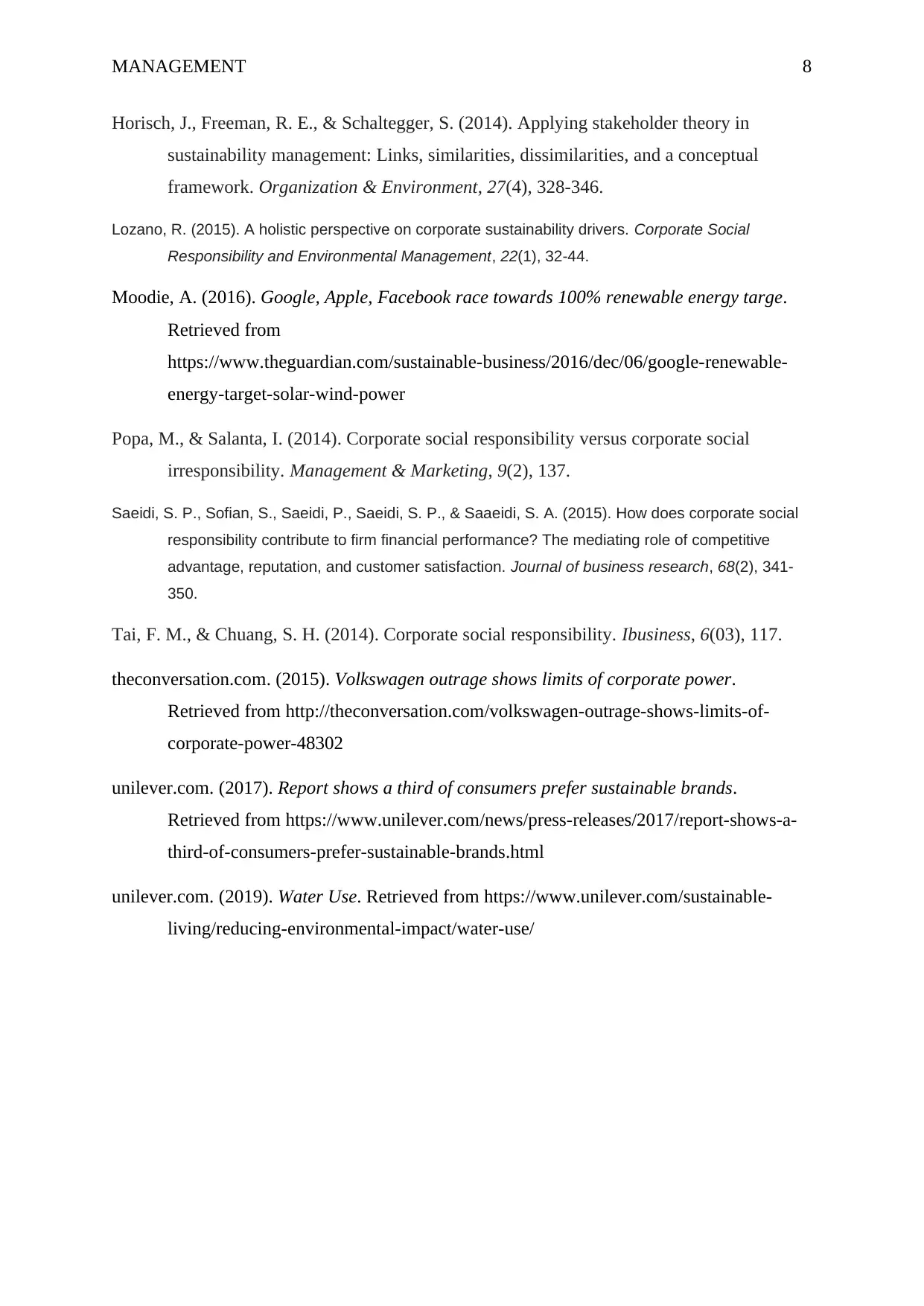
MANAGEMENT 8
Horisch, J., Freeman, R. E., & Schaltegger, S. (2014). Applying stakeholder theory in
sustainability management: Links, similarities, dissimilarities, and a conceptual
framework. Organization & Environment, 27(4), 328-346.
Lozano, R. (2015). A holistic perspective on corporate sustainability drivers. Corporate Social
Responsibility and Environmental Management, 22(1), 32-44.
Moodie, A. (2016). Google, Apple, Facebook race towards 100% renewable energy targe.
Retrieved from
https://www.theguardian.com/sustainable-business/2016/dec/06/google-renewable-
energy-target-solar-wind-power
Popa, M., & Salanta, I. (2014). Corporate social responsibility versus corporate social
irresponsibility. Management & Marketing, 9(2), 137.
Saeidi, S. P., Sofian, S., Saeidi, P., Saeidi, S. P., & Saaeidi, S. A. (2015). How does corporate social
responsibility contribute to firm financial performance? The mediating role of competitive
advantage, reputation, and customer satisfaction. Journal of business research, 68(2), 341-
350.
Tai, F. M., & Chuang, S. H. (2014). Corporate social responsibility. Ibusiness, 6(03), 117.
theconversation.com. (2015). Volkswagen outrage shows limits of corporate power.
Retrieved from http://theconversation.com/volkswagen-outrage-shows-limits-of-
corporate-power-48302
unilever.com. (2017). Report shows a third of consumers prefer sustainable brands.
Retrieved from https://www.unilever.com/news/press-releases/2017/report-shows-a-
third-of-consumers-prefer-sustainable-brands.html
unilever.com. (2019). Water Use. Retrieved from https://www.unilever.com/sustainable-
living/reducing-environmental-impact/water-use/
Horisch, J., Freeman, R. E., & Schaltegger, S. (2014). Applying stakeholder theory in
sustainability management: Links, similarities, dissimilarities, and a conceptual
framework. Organization & Environment, 27(4), 328-346.
Lozano, R. (2015). A holistic perspective on corporate sustainability drivers. Corporate Social
Responsibility and Environmental Management, 22(1), 32-44.
Moodie, A. (2016). Google, Apple, Facebook race towards 100% renewable energy targe.
Retrieved from
https://www.theguardian.com/sustainable-business/2016/dec/06/google-renewable-
energy-target-solar-wind-power
Popa, M., & Salanta, I. (2014). Corporate social responsibility versus corporate social
irresponsibility. Management & Marketing, 9(2), 137.
Saeidi, S. P., Sofian, S., Saeidi, P., Saeidi, S. P., & Saaeidi, S. A. (2015). How does corporate social
responsibility contribute to firm financial performance? The mediating role of competitive
advantage, reputation, and customer satisfaction. Journal of business research, 68(2), 341-
350.
Tai, F. M., & Chuang, S. H. (2014). Corporate social responsibility. Ibusiness, 6(03), 117.
theconversation.com. (2015). Volkswagen outrage shows limits of corporate power.
Retrieved from http://theconversation.com/volkswagen-outrage-shows-limits-of-
corporate-power-48302
unilever.com. (2017). Report shows a third of consumers prefer sustainable brands.
Retrieved from https://www.unilever.com/news/press-releases/2017/report-shows-a-
third-of-consumers-prefer-sustainable-brands.html
unilever.com. (2019). Water Use. Retrieved from https://www.unilever.com/sustainable-
living/reducing-environmental-impact/water-use/
⊘ This is a preview!⊘
Do you want full access?
Subscribe today to unlock all pages.

Trusted by 1+ million students worldwide
1 out of 9
Related Documents
Your All-in-One AI-Powered Toolkit for Academic Success.
+13062052269
info@desklib.com
Available 24*7 on WhatsApp / Email
![[object Object]](/_next/static/media/star-bottom.7253800d.svg)
Unlock your academic potential
Copyright © 2020–2025 A2Z Services. All Rights Reserved. Developed and managed by ZUCOL.





